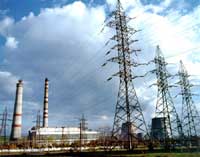EU leaders have agreed to work together to enhance energy security while stopping short of proposing any detailed solutions.
European Commission President Jose Manuel Barroso said ministers attending a summit in Brussels had pledged support for a common energy policy. But sharp divisions remain over how far energy markets should be liberalized and what kind of regulation is needed. It was feared the two-day meeting would be overshadowed by a protectionism row.
Energy challenge
EU members are split over how far governments should be allowed to protect businesses in key sectors of the economy, such as energy, from foreign takeover. France and Italy have clashed over a deal to merge two French energy firms, which critics say thwarts competition.
EU leaders signaled broad agreement over the need to enhance energy security, an issue highlighted by Russia's dispute with Ukraine over gas supplies earlier this year. Russia temporarily cut off supplies to its neighbor in a price dispute, threatening distribution to much of Western Europe.
"I am very delighted that the European Council is backing our call for an energy policy for Europe, that it makes sense to have a common strategy for Europe," Mr. Barroso said. "We need to use the power of our market to tackle energy challenges."
Lack of specifics
But there was no immediate indication of how the EU's 25 members planned to tackle specific problems such as soaring gas prices, the EU's reliance on oil and gas imports and moves to boost clean energy supplies.
Disagreement surfaced over how much liberalization is needed and whether there should be a single energy regulator for the EU.
"The construction of a Europe of energy cannot be confined to the liberalization of markets," French President Jacques Chirac told the summit, in notes later released by his staff.
However, German Chancellor Angela Merkel said the EU single market could only work "when electricity flows freely and when we accept European champions and not just think nationally."
France and Italy have been at loggerheads over the state-backed merger of Gaz de France and Suez, which is a takeover target for Italian firm Enel. The European Commission is examining if France broke EU laws when it brokered the deal.
Language spat
In a brief moment of discord, French President Jacques Chirac walked out of a session on Thursday when a fellow Frenchman chose to address the delegates in English. Mr. Chirac's protest came when Earnest-Antoine Seilliere, the French president of UNICE, the employers' organization, said he would address the meeting in English "because that is the accepted business language of Europe today".
A French official said Mr. Chirac, Foreign Minister Philippe Douste-Blazy and Finance Minister Thierry Breton left the room.
Mr Chirac returned after Mr. Seilliere had finished and remained as another Frenchman, European Central Bank President Jean-Claude Trichet, addressed the leaders in French. As well as energy, the summit is focusing on job creation, cutting red tape, and investment in skills and scientific research.




 By: N. Peter Kramer
By: N. Peter Kramer
